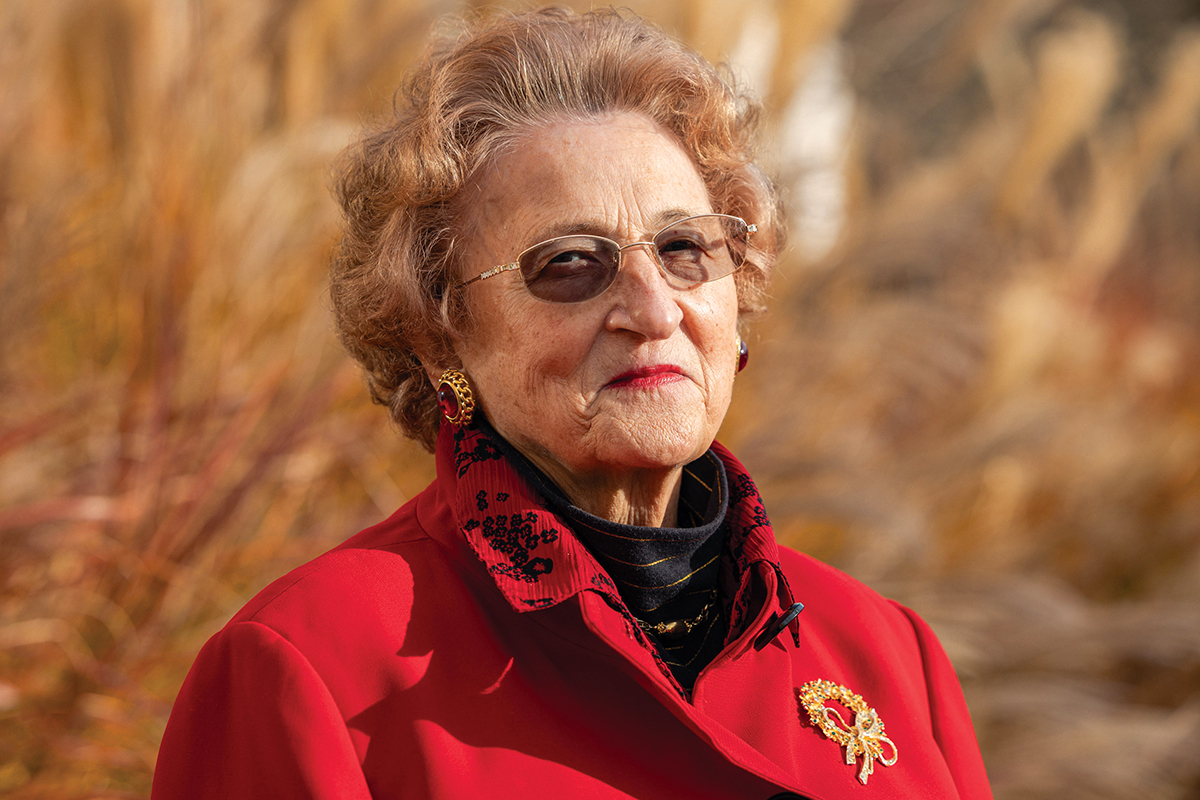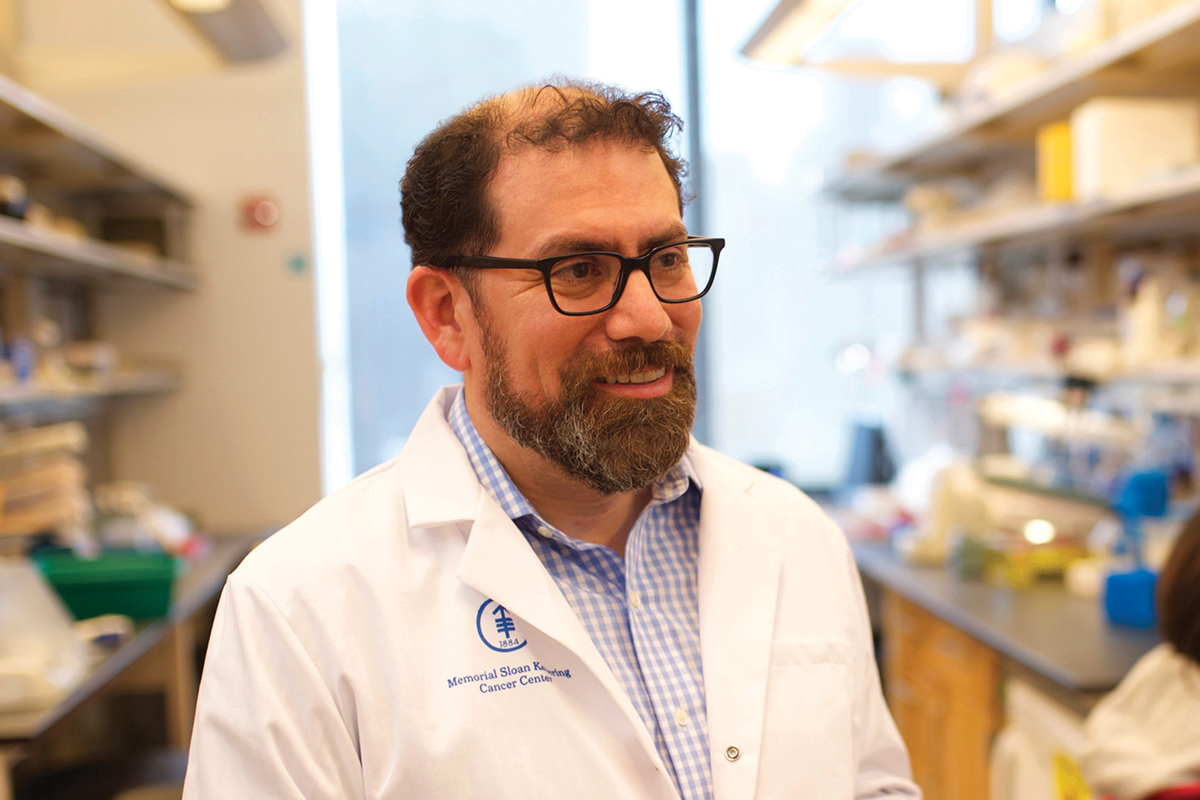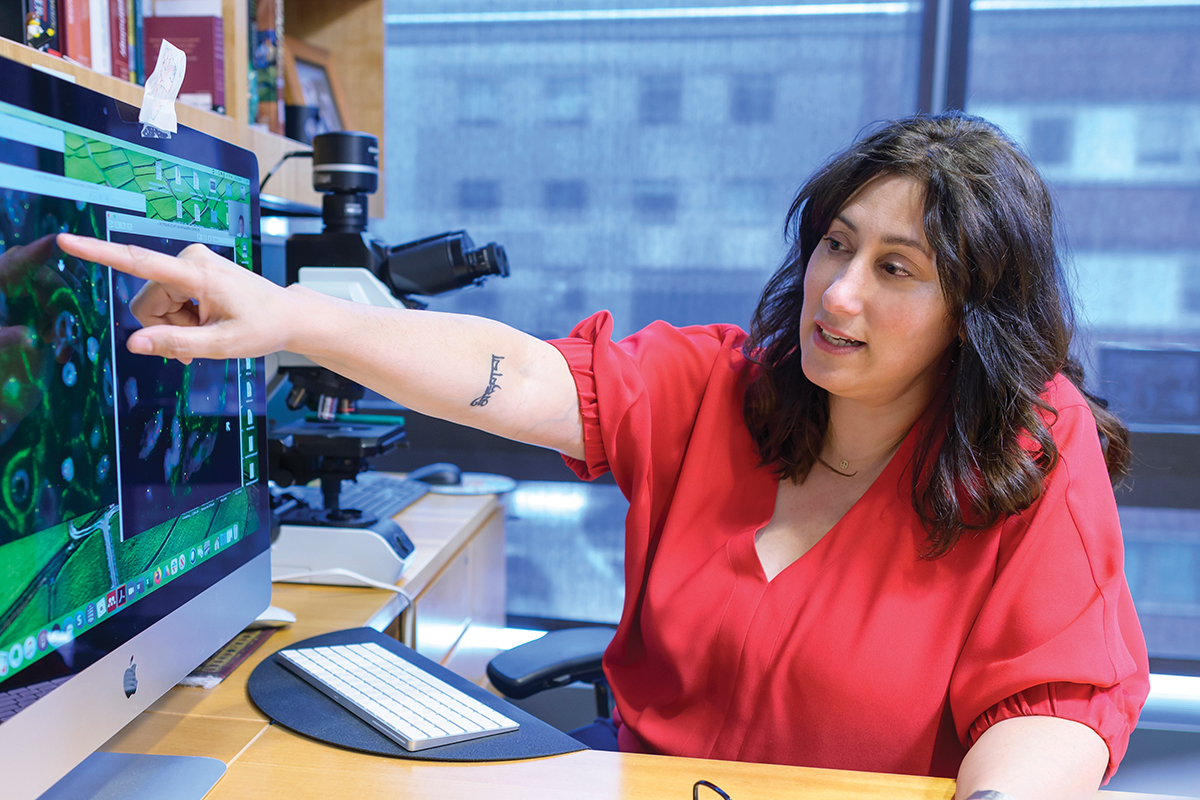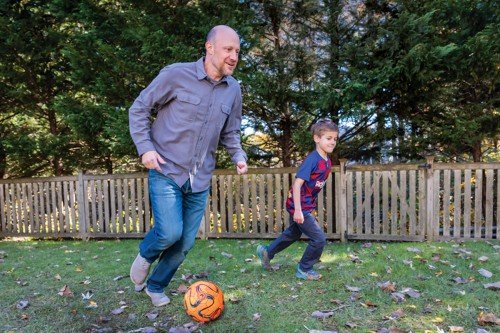
Vinod Balachandran is leading a clinical trial testing whether mRNA vaccines — the same technology used to create COVID-19 vaccines — can prevent pancreatic cancer from returning after surgery.
For Barbara Brigham, being diagnosed with pancreatic cancer in the fall of 2020 was a devastating blow in an already rough year. She had just lost her mother and husband after long illnesses, both needing extensive care. The 74-year-old semiretired librarian from Long Island was finally starting to focus on her own health needs.
She got the awful news from her doctor, Vinod Balachandran, who had been monitoring a pancreatic cyst that was discovered three years earlier. She had her regular imaging test and expected another clear report. But the next morning, she found out she had stage 2 pancreatic cancer — unrelated to the cyst, in a different part of the pancreas.
The outlook seemed grim. Pancreatic cancer is among the deadliest forms of the disease. Even people who are diagnosed and treated at the earliest stage have a 50% chance that the disease will come back.
But Dr. Balachandran suggested that in addition to surgery and chemotherapy, Barbara try something new: a small, preliminary clinical trial testing a vaccine using messenger RNA (mRNA) technology — the same technology used to create the COVID-19 vaccine. There are essentially two kinds of vaccines — those given as a precaution to prevent infection and those that are therapeutic and given after someone is sick. Barbara was given a therapeutic mRNA vaccine to train her immune system to be on the alert for cancer cells. It might reduce the risk that her cancer would return.
“I don’t think there was any hesitation about joining the trial,” Barbara says. “I had complete confidence in Dr. Balachandran. He said I would be a great candidate, and my son, who was with me, agreed it was the best way to go.”

“I had complete confidence in Dr. Balachandran. He said I would be a great candidate, and my son, who was with me, agreed it was the best way to go,” Barbara Brigham says about joining an early clinical trial testing a pancreatic cancer vaccine.
Learning From Long-Term Survivors
In 2017, Dr. Balachandran’s laboratory had made an important finding about why some people manage to beat the odds and survive pancreatic cancer after their tumors are removed. Researchers analyzed samples from these lucky few and found that the tumors contained proteins, called neoantigens, which immune cells recognize as being especially foreign. These conspicuous targets provoked the immune system to attack, keeping the cancer at bay.
When his team published the findings in the journal Nature, Dr. Balachandran was contacted by Uğur Şahin, the CEO of the German biotechnology company BioNTech (which later worked with Pfizer in 2020 to develop the first COVID-19 vaccine). Dr. Şahin said he had read the paper and was interested in working with Dr. Balachandran on an mRNA vaccine for pancreatic cancer. Shortly after, Dr. Balachandran and his team flew to Germany to meet with BioNTech and explore the idea.
The collaboration progressed quickly. By 2019, BioNTech and Dr. Balachandran had created a vaccine and set up a clinical trial for 20 patients, including Barbara, to test if it was safe. She and the other patients had their tumors removed and genetically sequenced to look for mutations that produce the neoantigen proteins that would be the most easily targeted by the immune system. Each patient received a vaccine based specifically on their tumor’s molecular fingerprint.
“The vaccine is designed to replicate the success of long-term survivors in a broader group of people,” Dr. Balachandran says. “It’s a great example of MSK’s forward-thinking vision in cancer care — to bring the most exciting medicines to cancer patients.”
‘A Very Exciting Time for the Field’
Pancreatic cancer is projected to become the nation’s second leading cause of cancer death within 10 years, but there are good reasons for optimism thanks to this kind of translational research discovery by investigators at the Sloan Kettering Institute (SKI) and across MSK.
Experts in pathology, cancer genetics, computational biology, and clinical oncology are closely collaborating within the David M. Rubenstein Center for Pancreatic Cancer Research, overseen by physician-scientist and David M. Rubenstein Chair Christine Iacobuzio-Donahue.
“MSK is extraordinary in terms of the infrastructure, the resources, and the talent across different specialties for any aspect of pancreatic cancer,” she says. “As a pancreatic cancer researcher, it’s a very exciting time for the field. I think it’s just a matter of time until we crack this.”
Lab Discoveries Drive Progress Decades Later
The mRNA vaccine is just one example of progress in fighting pancreatic cancer. It’s also a striking example of how basic research discoveries into cell behavior can translate into applications for patients.
In a compelling case of scientific happenstance, a seemingly unrelated basic research finding is bearing fruit many years later. In the early 1990s, Maria Jasin, a member of the Developmental Biology Program and William E. Snee Chair in SKI, made groundbreaking discoveries about how DNA repairs itself when it becomes damaged by things like sunlight, smoking, or radiation. When the repair process doesn’t work correctly, damage in the genome can accumulate and eventually lead to cancer.
Dr. Jasin’s work helped researchers understand the role of the BRCA1 and BRCA2 genes. When defective versions of these genes are inherited, they are linked to breast, ovarian, and other cancers, including pancreatic. Based on her findings, scientists began developing a class of tumor-fighting drugs called PARP inhibitors for patients with a BRCA mutation. In 2019, nearly three decades after Dr. Jasin’s initial discovery, the FDA approved the PARP inhibitor olaparib (Lynparza®) for people with metastatic pancreatic cancer who have an inherited BRCA mutation.
“You can see the thread leading from Maria’s major body of work to this class of drugs, from her laboratory bench to the patients’ bedside,” Dr. Balachandran says.
Immunotherapy Helps Some Patients
Another way to target pancreatic cancer cells is through a genetic abnormality called a mismatch repair (MMR) deficiency. Research first led by MSK medical oncologist and Grayer Family Chair Luis Diaz when he was at Johns Hopkins discovered that patients with MMR-deficient cancers respond well when treated with the immunotherapy drug pembrolizumab (Keytruda®). Now patients found to have MMR-deficient tumors can receive pembrolizumab as a standard treatment.
“Even though pembrolizumab has helped only a small fraction of people with pancreatic cancer, it proved that immunotherapy can actually work for this disease,” Dr. Balachandran says.

Research by Luis Diaz has helped identify pancreatic patients who would benefit from immunotherapy drugs.
The Lethal Cascade of Genetic Mutations
There is other progress, too. Dr. Iacobuzio-Donahue says that the pancreatic research community tends to agree that most of the important pancreatic cancer genes — and the mutations within them — have been identified. With advances in technology, she has shifted her research lens to look in more granular detail.
“My team is now focused on the timing of genetic mutations: which ones initiate the cancer, which ones occur after the tumor forms, as well as factors in the tumor microenvironment — the tissues, blood vessels, immune cells, and other noncancerous components surrounding a tumor,” she says.
Her lab is collaborating with the lab of SKI computational biologist and Alan and Sandra Gerry Chair Dana Pe’er to dig deeper. The two scientists are principal investigators of a large grant awarded to MSK from the Human Tumor Cancer Atlas Network, a National Cancer Institute– funded Cancer Moonshot initiative.
Dr. Pe’er is an expert in single-cell analysis, which uses new technologies to study cancer one cell at a time in exquisite detail. This enables researchers to look at RNA within individual cells to determine which genes are expressed, or “turned on.”
“Doing the single-cell RNA sequencing with Dana is giving us data that is profound — it’s fascinating looking at the disease in a completely different way after my years of focusing on DNA,” Dr. Iacobuzio-Donahue says.
She says there is intriguing evidence that the tumor microenvironment plays a critical role in selecting which cancer cells grow and multiply based on their genetic makeup. Some tumors will spread, while others will stay in the pancreas.
“Aggressive primary tumors have distinct genetic patterns, and we’re really trying to understand how that affects the process at the molecular level.”
If researchers can classify tumors based on these genetic patterns, they would know, for example, which tumors are likely to spread and which are not.
“I’m excited about it because it is interesting science, and it has direct clinical relevance,” Dr. Iacobuzio-Donahue says. “I could absolutely see how sorting out this question could benefit patients within five years.”

“As a pancreatic cancer researcher, it’s a very exciting time for the field,” says Christine Iacobuzio-Donahue.
Barbara’s Best Hope
Today, Dr. Balachandran’s early vaccine trial offers the most promise for Barbara. Her tumor was removed in October 2020 and used to make an mRNA vaccine personalized for her. She received nine vaccine doses, in addition to chemotherapy and a single dose of immunotherapy — most of it at MSK Commack, an outpatient center on Long Island. Her treatment was completed by September 2021. Like the other people in the vaccine trial, she has a CT scan every three months to see if the cancer returns.
“I feel very well so far, and for now there is no detectable cancer,” she says. “I had a unique support system from my family, who have helped me through this and who drove me to many appointments, including my three sons, my in-laws, my niece and nephew, and my brothers.”
Dr. Balachandran completed the trial in 18 months, a full year ahead of schedule despite the COVID-19 pandemic.
“A lot of people thought this trial would not be possible,” Dr. Balachandran says. “It involves very difficult surgery and then shipping a tumor to Germany and back in a short time frame. But we have a phenomenal staff, and we’re able to do these trailblazing clinical trials using this new mRNA technology.”
He is hopeful the vaccine could lead to a new wave of treatments benefiting a significant percentage of pancreatic cancer patients.
“The earlier discoveries that led to treatment with PARP inhibitors and immunotherapy drugs apply to a fairly small subset of patients,” he says. “We still need something for the bigger fraction. We’ve begun to take the next big step.”




